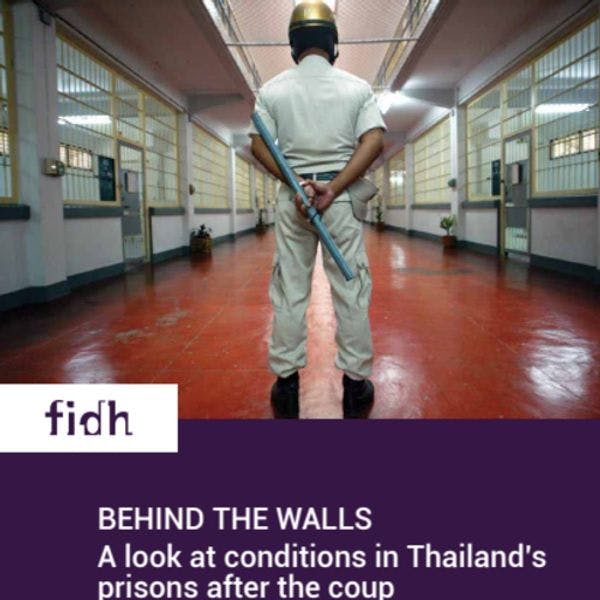Behind the walls: A look at conditions in Thailand’s prisons after the coup
By FIDH - International Federation for Human Rights
Thailand’s prison population has steadily increased over the years and the country has the dubious distinction of having the largest prison population and the highest incarceration rate among Association of Southeast Asian Nations (ASEAN) member states.
For more than a decade, United Nations (UN) human rights mechanisms have expressed concern over prison conditions in Thailand. Regrettably, successive Thai governments have failed to make any progress in the implementation of the UN’s recommendations and to uphold their own commitments to improve prison conditions. In addition, since the 2014 military coup, Thailand’s junta has enforced measures that have caused conditions in the prisons to deteriorate. The junta also increased the use of military facilities to detain civilians.
As documented in this report, Thailand’s ongoing failure to enact a comprehensive prison reform has created conditions for human rights violations to be rife in its prison system in breach of the country’s obligations under international instruments to which it is a state party
The Thai Department of Corrections’ motto, ‘Caring Custody, Meaningful Rehabilitation, International Standard Achievement’,1 could not be further from the reality of the Thai prison system. Research conducted by FIDH and UCL on two large prisons in Bangkok suggests that Thailand’s prison conditions fail to meet international standards and to create an environment conducive to the rehabilitation of prisoners.
Overcrowding remains the most pressing issue in Thai prisons. Thailand’s average yearly prison population has steadily increased over the years and, aside from the periodic royal amnesties, no other effective and sustainable measures have been adopted to significantly reduce the population. Based on a standard to provide a surface area per prisoner of 2.25m2 , available official statistics representing 74% of Thailand’s prisons and 91% of its overall prison population show that these prisons are operating with a prison population of more than double the intended capacity – with an occupancy level of 224%.
Inadequate access to medical treatment, insufficient food and potable water, and poor sanitation facilities continue to plague the prisons examined in this report. It is likely that similar conditions exist in other prisons across Thailand. Medical care and special arrangements for pregnant women are particularly lacking. Prisoners are often subjected to exploitative labor practices characterized by harsh working conditions and insufficient remuneration. Punishment in prisons contravenes international standards and, in some cases, may amount to torture and ill-treatment. Prisoners’ statements indicate that restraining devices, such as shackles, have been excessively used. Finally, inmates have reported unreasonable restrictions placed on visits and correspondence with family and friends. While procedures for making complaints exist, prisoners are afraid to lodge complaints out of fear of retaliation at the hands of prison officials.
The situation has not improved since the 22 May 2014 military coup. Under the National Council for Peace and Order (NCPO) access to prisons has become more difficult. In addition, based on interviews with former prisoners and families of current inmates, FIDH and UCL were able to document that prison authorities have enforced stricter prison regulations and further curtailed prisoners’ rights. Of particular concern is the increased use of military bases to detain civilians, which do not afford detainees many of their basic rights. The use of the Nakhon Chaisri temporary detention facility inside the 11th Army Circle base in Bangkok illustrates this trend. Since the establishment of Nakhon Chaisri less than two years ago, there has been a lack of access for independent monitors, two custodial deaths, and allegations of torture have surfaced.
This report recommends numerous measures to improve detention conditions, including providing independent inspection bodies unfettered access to all prisons and allowing non-governmental organizations with a relevant mandate to conduct visits to places of detention, interview inmates, and assess conditions without undue hindrance.
